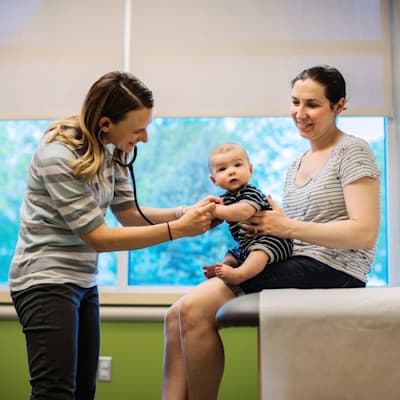Childhood Vaccines: Common Questions. Real Answers.
Learn why routine vaccines are a safe and effective way to protect your child and the greater community against preventable contagious diseases.

Nov. 5, 2025
Frequently Asked Questions About Childhood Vaccines
Many parents have questions about routine childhood vaccines – how they work, why they’re needed and which claims are true. Our pediatric experts are here with answers you can trust to make the best decisions to protect your family. This quick and easy-to-digest guide addresses the most common concerns about vaccines for children.
Why are vaccines important for my child?
Your child is exposed to thousands of germs every day. Just like your child’s brain learns to read, your child’s body learns to fight germs step by step. Vaccines act like “beginner books” for the immune system, helping the body prepare for illness without the risk of getting sick.
Vaccines help build strong, natural protection against diseases – safely and effectively – to protect your child against serious illness and even death. High childhood vaccination rates also help create community immunity, which offers widespread protection against preventable contagious diseases.
Vaccines are a proven way to protect children from preventable illnesses and keep them healthy and thriving. They’re backed by decades of research and recommended by trusted pediatricians because they help keep children healthy, in school and out of the hospital.
Are vaccines safe?
Yes, vaccines are very safe. Vaccines undergo rigorous testing and ongoing monitoring to ensure safety. Serious side effects are extremely rare.
Wouldn’t it be better for my child to get this disease naturally?
Getting diseases naturally can be dangerous and lead to serious complications, like pneumonia, brain damage, cancer, decreased fertility or even death. Some illnesses, like measles, can hurt the immune system and fail to prevent future disease.
Why do kids get so many vaccines at once?
Making sure children’s immune systems are prepared to prevent disease is important. When children are given vaccines on schedule, or to catch up if they’re behind, it can seem like a lot; however, studies show that more shots per visit do not cause the child more stress. Combination vaccines are used to protect against multiple diseases with fewer injections.
Can I space out my baby’s vaccines?
While it’s understandable to want to go slow, spacing out vaccines is not recommended because doing so can leave babies vulnerable to serious diseases. The standard schedule is based on years of research to give the best protection at the right time. Delaying vaccines doesn’t make your child safer; it just increases the risk of illness.
Do vaccines or vaccine ingredients cause autism?
No. Vaccines do not cause autism. Major medical studies around the world have found no link between autism and vaccines, vaccine preservative thimerosal or other vaccine ingredients and autism. The idea started from a discredited study that has been proven false and was retracted. The number of vaccine doses given in the first two years of life does not impact autism.
If everyone else is vaccinated, why does my child need to be?
Relying on others to be vaccinated puts vulnerable people at risk, including babies, the elderly and those with weak immune systems. Vaccines protect both your child and the community by stopping the spread of disease. The more people are vaccinated, the harder it is for diseases to spread. Working together, we protect communities, entire schools and sports teams from outbreaks of diseases that take kids away from learning, playing and growing.
What side effects should I expect after my child is vaccinated?
Mild side effects like a sore arm, fever or fussiness are common and usually go away in a day or two. These are normal signs that the body is building protection. Serious side effects are very rare, but you should contact your doctor if anything seems unusual.
Contact Children’s Nebraska for Vaccine Support.
Many parents have questions about vaccines – how they work, why they’re needed and which claims are true. Our pediatric experts are here with answers you can trust. Talk to your child’s doctor to learn more or schedule an appointment.




